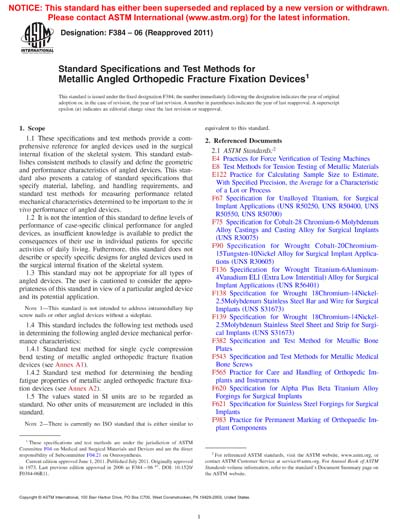Historical
ASTM F384-06(2011)
Standard Specifications and Test Methods for Metallic Angled Orthopedic Fracture Fixation Devices
1.1 These specifications and test methods provide a comprehensive reference for angled devices used in the surgical internal fixation of the skeletal system. This standard establishes consistent methods to classify and define the geometric and performance characteristics of angled devices. This standard also presents a catalog of standard specifications that specify material, labeling, and handling requirements, and standard test methods for measuring performance related mechanical characteristics determined to be important to the in vivo performance of angled devices.
1.2 It is not the intention of this standard to define levels of performance of case-specific clinical performance for angled devices, as insufficient knowledge is available to predict the consequences of their use in individual patients for specific activities of daily living. Futhermore, this standard does not describe or specify specific designs for angled devices used in the surgical internal fixation of the skeletal system.
1.3 This standard may not be appropriate for all types of angled devices. The user is cautioned to consider the appropriateness of this standard in view of a particular angled device and its potential application.
Note 1—This standard is not intended to address intramedullary hip screw nails or other angled devices without a sideplate.
1.4 This standard includes the following test methods used in determining the following angled device mechanical performance characteristics:
1.4.1 Standard test method for single cycle compression bend testing of metallic angled orthopedic fracture fixation devices (see Annex A1).
1.4.2 Standard test method for determining the bending fatigue properties of metallic angled orthopedic fracture fixation devices (see Annex A2).
1.5 The values stated in SI units are to be regarded as standard. No other units of measurement are included in this standard.
Note 2—There is currently no ISO standard that is either similar to equivalent to this standard.
A2.1.1 This test method describes methods for bending fatigue testing in order to determine intrinsic structural properties of metallic angled devices. The test method may be used to determine the fatigue life at a specific or over a range of maximum bending moment levels or to estimate the fatigue strength for a specified number of fatigue cycles of an angled device.
A2.1.2 This test method is intended to provide a means to mechanically characterize different angled device designs. This test method does not define angled device performance levels since these characteristics are driven by patient-specific clinical requirements.
A2.1.3 Units—The values stated in SI units are to be regarded as standard. No other units of measurement are included in this standard.
A2.1.4 This standard does not purport to address all of the safety concerns, if any, associated with its use. It is the responsibility of the user of this standard to establish appropriate safety and health practices and to determine the applicability of regulatory limitations prior to use. Note A2.1—Currently, there is no ISO standard that is similar, or equivalent, to this test method.
Content Provider
ASTM International [astm]






